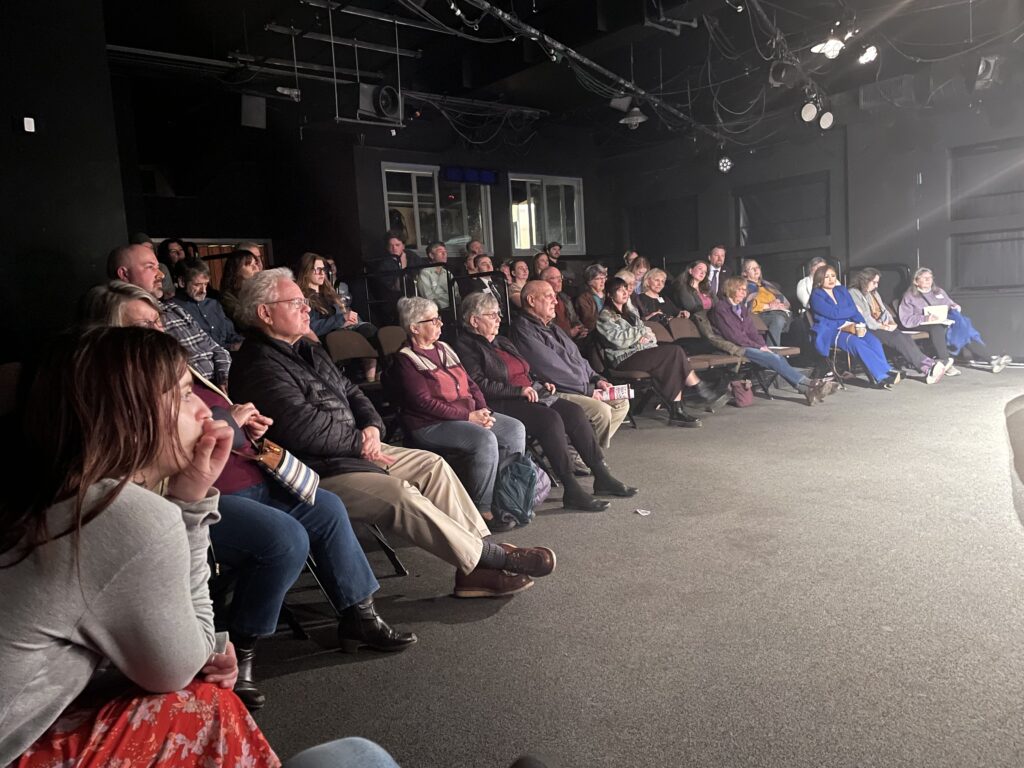Physical Address
304 North Cardinal St.
Dorchester Center, MA 02124
Physical Address
304 North Cardinal St.
Dorchester Center, MA 02124

The April 10th journalism forum in Duluth addressed more than its promoted agenda of ‘covering politics in greater Minnesota.’ Iron Range journalist Aaron Brown moderated a panel of influential media leaders in a discussion that touched on everything from what constitutes news to how to deliver news to a disengaged generation who get their information from social media bytes. Panelists included Marshall Helmberger, publisher of The Timberjay, Star Tribune politics and government editor Laura McCallum, Duluth News Tribune political reporter Tom Olsen, and WDIO News anchor/reporter Renee Passal. The free public event was co-sponsored by the Minnesota Society of Professional Journalists, the Minnesota chapter of the Asian American Journalists Association, Twin Cities Black Journalists, the Minnesota News Guild, the Star Tribune and the University of Minnesota Duluth.
Questions were posed to the panel about the role of journalists in a divisive political climate, how they can do a better job covering races and issues in communities outside major metropolitan areas, and how they can work together to combat misleading news. Answers focused on understanding regional issues of importance, getting local perspectives, fact-checking, and selecting appropriate delivery formats.
Marshall Helmberger perhaps best captured the concerns of rural Minnesota communities when he described the significance of a series of stories about providing regional ambulance service that is financially viable. Based in Tower, MN, with a population of about 400, and covering 5 widespread rural communities in a region around Ely, Helmberger said he is more concerned about covering the availability of ambulance service and the condition of roads than in whether there will be Uber and Lyft service available in Minneapolis after May 1st. He said these transportation issues illustrate an urban-rural divide.
Helmberger advocated being local by focusing on subjects and perspectives of local interest to help drive engagement of readers. Laura McCallum agreed that having reporters on site and paying attention to what’s happening locally is important. Remote reporting, she said, is not the same as having people in the community. But Renee Passal added a caveat that even though the Uber/Lyft issue might not be important to someone living in Cook, it could affect them in the future if they traveled to an event in Minneapolis. She said it was important to make connections like this.
How do you reach out to a generation of politically weary people? Tom Olsen said there’s not a single solution and that news providers have to meet people where they’re at because people are not going to navigate to news organization websites. Laura McCallum agreed that part of the solution is being where the readers and viewers are by presenting news in a format they can relate to and use, and by getting to the humanity behind the policies and the politics.
Renee Passal pointed out that when asked ‘how do you know about this?,’ many young people invariably answer that they ‘saw it on YouTube.’ She suggested funny YouTube shorts of ‘behind the scenes’ moments – shorts of real people behind news stories – might help engage viewers. At the same time, it’s important to be wary of over-simplifying and becoming irrelevant.
“If one person writes a story saying the sky is blue, and another person writes a story saying the sky is green, you can’t decide on the merits of that who is right.” Said Tom Olsen. “You have to be discerning. Try to explain things better, pull in a statistic, explain why and where perspectives are coming from.“
Renee Passal advised not to end a story with a statement from one side or the other. It may prompt questions about bias and a perception that the other side was not covered fairly. She said ending with an observation or reference from the reporter can give better balance to a story.
But how can you overcome a perception of biased reporting if an interview is denied? Laura McCallum urged reporters to continue asking for interviews, staking out where people are, and asking them questions. Marshall Helmberger said that in the absence of a response, he lets readers know he tried and how he tried. Just pointing out how much we tried, said Tom Olsen, can overcome perceptions of bias.
Some audience questions built on a running discussion of the advantages and disadvantages of using social media delivery platforms – and the role of artificial intelligence (AI). Social media, it was agreed, is very helpful in outreach and gathering information – but it can very quickly become toxic. Aaron Brown referred to an event where he got to test drive an electric car. His comment afterwards was that he ‘tried it, but didn’t know where to charge it.’ That brought an immediate online response from an individual he said launched into a kind of ‘instant beratement’ in a firestorm of uninformed comments.
Addressing an audience question about whether news gathering organizations seek out polarizing stories to drive reader engagement, Laura McCallum said she does look at the metrics, but she doesn’t do ‘clickbait journalism’ – the use of sensationalized or misleading headlines or ledes to encourage readers to click on content links. A lot of click-bait stories, it was pointed out, are generated by artificial intelligence. But AI can also help generate sports stories from boxscore information. Though Laura did not foresee AI replacing journalists, she was’t sure how to address its ‘scraping’ effects. AI certainly needs some fine-tuning, concluded Tom Olsen – it’s not yet ready for prime time.
The forum drew a standing-room only crowd of more than 100 people to the Zeitgeist Performance Theater in downtown Duluth. It was a successful beginning to what many in attendance hope will be more jointly sponsored journalism events across the upper Midwest.

You have to be discerning. Try to explain things better, pull in a statistic, explain why and where perspectives are coming from.
-Tom Olsen, Duluth News Tribune